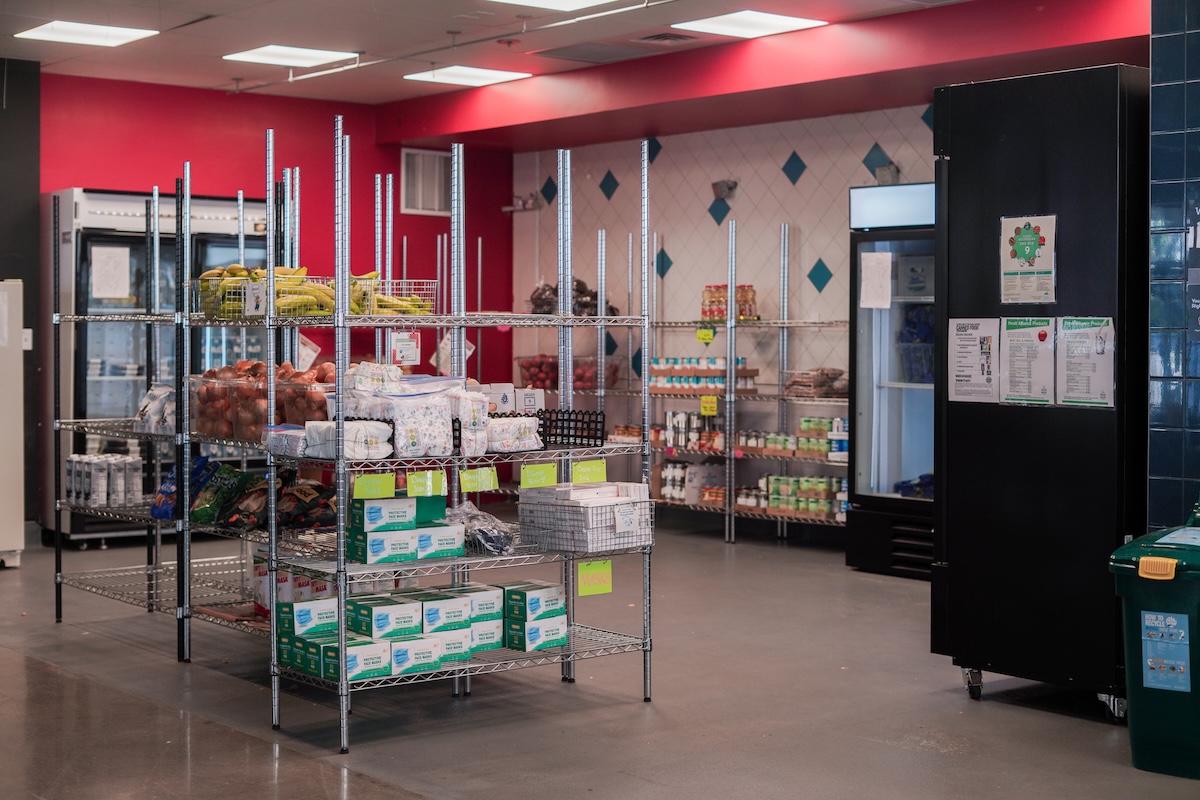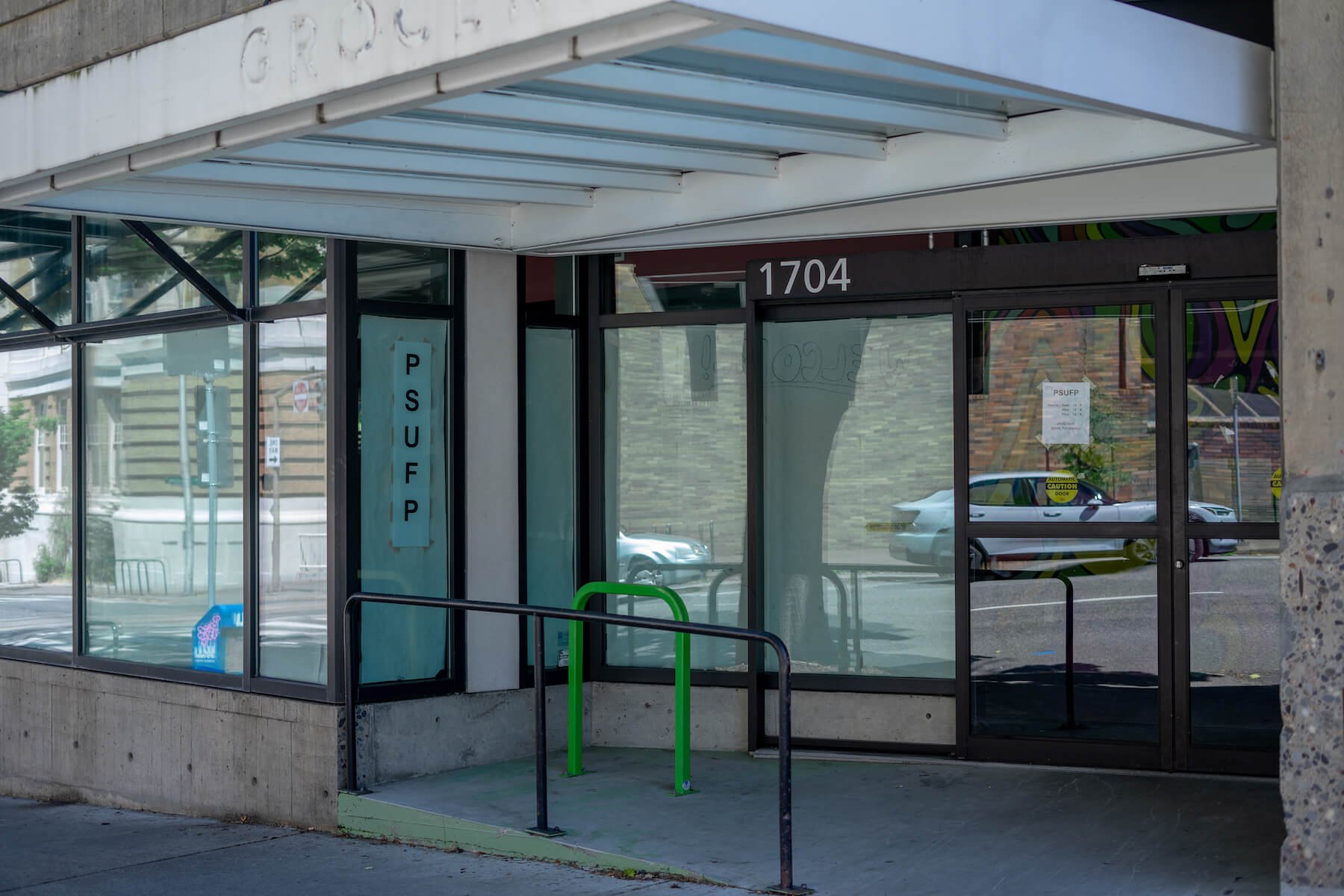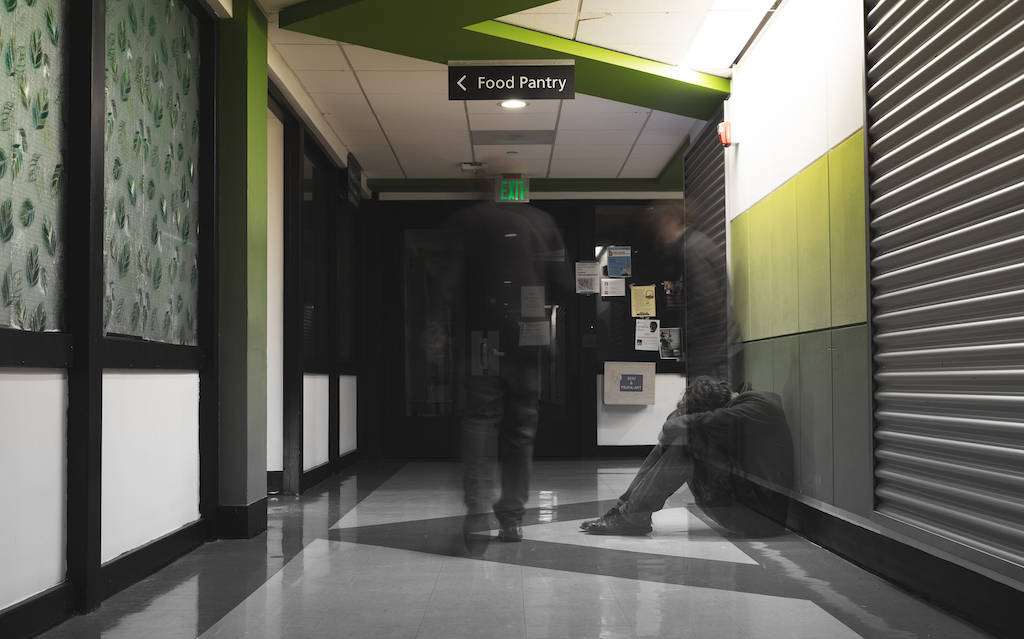These days, it is typical to see a line out the door and down the block when the Portland State Food Pantry opens. The pantry temporarily moved from its old location in the Smith Memorial Student Union (SMSU) basement and into Green Zebra’s old space at 1704 SW Broadway.
As they await the remodel of their previous space, the number of students served has increased exponentially. Last year, approximately 110 students were served per day. Earlier this term, over 300 students were served in one day.
In the coming months, the pantry will continue to see many changes—including a name change.
Bea McGrath—the pantry’s general manager—explained how pantry staff voted to change the pantry’s name to The Smallwood Food Pantry to honor the pantry’s former general manager Bobby Smallwood. Smallwood was killed this July during a shooting at Legacy Hospital where he worked as a security guard.
“He really stuck around and was extremely dedicated to the success of the food pantry and the mission,” McGrath said. “There are still several people here who worked with him at the time. I literally had someone come in off the street yesterday and ask about him, because they knew each other from back in the day. He had a big impact on keeping the pantry going during the [COVID-19] pandemic and also was just extremely dedicated, which is what we really need from our staff and our volunteers. It’s just a very hard job, so having someone who’s dedicated to the mission is really important.”
Though they thought they would be able to move into the remodeled space at the beginning of fall term, McGrath said delays in construction and changes in the plan for the space delayed the move until winter break.
“They say they’re going to be done in November, but we don’t want to shut down the food pantry mid-term and try to do the move,” McGrath explained. “The plan is that the construction will be done beginning to mid-November, and hopefully I’ll have all the shelving and stuff come in around that time… and get everything moved over and set up for operations before winter term starts. Day one winter term—hopefully we’ll be ready to roll.”
McGrath explained how the new space would help alleviate the safety concerns they dealt with in the old space. In a previous interview with Portland State Vanguard over the summer, the pantry’s former general manager—Trenna Wilson—said the pantry staff was experiencing high turnover rates, staff burnout and injuries on the job due to the physical demands of food pantry jobs. Wilson said they could streamline operations and avoid unnecessary physical labor and safety issues with an expanded space.
In August, NBC News reported that the Bureau of Labor Statistics indicated food prices were one of the most significant contributors to the increase in the Consumer Price Index, which rose to 3.2% in July from the 3% reported in June. According to NBC, food-at-home prices—such as food purchased at grocery stores—increased by 3.6% over 12 months. Food-away-from-home prices—such as food at restaurants—increased by 7.1%.
According to a 2020 report by the PSU Homelessness Research & Action Collaborative (HRAC), 47% of PSU students and 16.5% of PSU staff experienced food insecurity the month leading up to the survey.
“41.8% of students reported cutting the size of their meals because they did not have enough money for food,” HRAC reported. “On average, this occurred on almost 10 of the past 30 days. Almost 9% of students indicated that they did not eat for a whole day because there was not enough money for food. On average, this occurred on approximately 6 of the past 30 days.”
Wilson said the need for an efficient food pantry for PSU students is dire in this current economic climate. McGrath explained how—with the new pantry space and some new implementations—they hope to serve the PSU community better while ensuring the safety of their staff.
“Hopefully having this expanded space will make it also safer for staff, where we have less of a trip hazard,” McGrath said. “Also, it can help encourage better lifting habits, because we had a little bit of a back-strain issue this past year with how much food we’re moving.”
McGrath said their numbers have increased mainly due to their decision to remove some patron restrictions. “Two years ago, we were doing about… 50–60 people a day on average, and that had been a historic norm,” McGrath said. “I think one of the things that was holding us back was that we had restrictions on how much people could take and how many times people could visit a week.”
“Now, we’ve removed restrictions on how much people can take,” McGrath said. “We have recommendations, but it’s completely up to the students whether they’re going to follow those. And also we have no restrictions on how often people can come. They can come every day. They can even come twice a day… Removing those restrictions was definitely a huge step and moving towards open distribution was a huge step in just making it more worthwhile for patrons to come.”
Most of the pantry’s food comes from the Oregon Food Bank, a nonprofit which collects and distributes food through a network of 21 regional food banks and more than 1,400 food-assistance sites. In the coming months, McGrath said they want to request an additional pick-up order from the food bank, which they started doing last year but had to stop over the summer due to a decrease in patronage and lack of staff.
Additionally, they will start a mini-pantry program which will place smaller food pantries in different locations around campus to serve underserved communities, such as people with mobility issues or time constraints preventing them from visiting the pantry.
They also plan to work alongside unions at PSU to ensure members have access to pantry services and to establish a collaborative relationship with the Basic Needs Hub. To do this, McGrath explained how they would need to move away from being an entirely student-operated organization and gain funding to hire at least one full-time staff member. They plan to ask the Student Fee Committee for a budget expansion and hope to avoid budget cuts.
“Trying to serve this many people with fewer staff [members] is hard,” McGrath said. “I won’t say impossible—it’s close to impossible—but it’s very hard. We feel like having this robust of a food pantry really makes Portland State University stand out amongst all of the universities. And just solidifying that and having someone who will stay with the job and just continue the success—potentially for decades—would really be helpful, but to do that we need more funding.”






